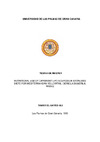Please use this identifier to cite or link to this item:
https://accedacris.ulpgc.es/jspui/handle/10553/60453
| DC Field | Value | Language |
|---|---|---|
| dc.contributor.advisor | Izquierdo López, María Soledad | - |
| dc.contributor.author | El-Sayed Ali, Tamer | - |
| dc.date.accessioned | 2020-01-21T07:16:12Z | - |
| dc.date.available | 2007-06-06T00:00:00Z | es |
| dc.date.available | 2020-01-21T07:16:12Z | - |
| dc.date.issued | 1999 | en_US |
| dc.identifier.other | contentdm-postulpgc | es |
| dc.identifier.uri | https://accedacris.ulpgc.es/handle/10553/60453 | - |
| dc.description.abstract | In the recent decades, as a result of increasing the world population, fish demand and overexploitation of fisheries stocks, aquaculture techniques have been developed significantIy to satisfy the market needs. The main object of any fish farm is realizing a maximum production with a minimum cost. From the economical point of view, the diet is the most expensive element in the flsh culture production, so nowadays there are running researches focusing on replacing the fish meal and fish oil with other alternative protein and fat sources, respectively. New species culture is a recent aim, it is valuable not only for the market diversification and attracting more clients but also for maintaining the wild fisheries stocks. Mediterranean yellowtail (Seriola dumerilii) is a promising species in aquaculture in the Mediterranean countries, it is due to its fast growth rate compairing with other cultured species and for its high commercial value. This work studies the effect of extruded diets containing different lipid sources on growth, feeding behaviour and body composition of Mediterranean yellowtail juveniles. Three isoenergetic and isoproteic diets were formulated with a constant lipid content about 18%. Fish oil was the only added lipid source in the control diet, whereas the other experimental diets contained sunflower oil and animal tallow as partial replacers of fish oil. In general, the resuts obtained have demonstrated that sunflower oil may be used as a partil replacer of fish oil, whereas fish oil substitution by animal tallow was proved to have negative effects in the culture of Mediterranean | en_US |
| dc.description.abstract | En los últimos decenios, a consecuencia de abastecer a una población en continuo crecimiento, la acuicultura se ha desarrollado significativamente para satisfacer la necesidad del mercado. El objetivo principal para cualquier piscifactoría es realizar mixima producción con el mínimo coste posible. Desde el punto de vista económico, la dieta es el elemento mas caro en la piscicultura por eso, diferentes investigaciónes concentran sus esfuerrzos en sustitución de la harina de pescado y cl aceite de pescado con otras fuentes alternativas de proteínas y lipidos, respectivamente. El cultivo de especies nuevas es una línea de investigación prioritaria, para diversificar el mercado y mantener el stock salvaje. Pez limón (Seriola dumerilii) es una especie con futuro en la acuicultura en los países del Mediterráneo, esto es debido a su crecimiento rápido en comparación con otras especies cultivadas y para su alta valor comercial. Dentro de este contexto, en el presente trabajo se estudia el efecto del pienso extruido con diferentes fuentes de Iípidos, aceite del pescado, aceite del girasol y grasa animal, en el crecimiento, comportamiento alimentario y composición de la carne de los juveniles de este especie. Se formularon 3 dietas isoenergeticas e isoproteícas con un contenido constante de los lípidos de aproximadamente 18%. De manera general, los resultados muestran que, la sustitución parcial del aceite de pescado por el aceite de girasol no afecta negativamente el crecimiento de los peces, mientras que la grasa animal es perjudicial. | en_US |
| dc.format | es | |
| dc.format.mimetype | 300 ppp., TIFF sin compresión | es |
| dc.language | spa | en_US |
| dc.rights | Acceso restringido para la comunidad universitaria de la ULPGC | es |
| dc.subject | 251092 Acuicultura marina | en_US |
| dc.subject.other | Peces | en_US |
| dc.subject.other | Medregal | en_US |
| dc.subject.other | Alimentación | en_US |
| dc.title | Nutritional use of different lipd sources in extruded diets for mediterranean yellowtail (Seriola Dumerilii, Risso) | en_US |
| dc.title.alternative | Utilización nutritiva de diferentes fuentes de Iípidos en piensos extruidos por la seriola mediterránea (Seriola dumerilii, Risso) | en_US |
| dc.type | info:eu-repo/semantics/masterThesis | en_US |
| dc.type | MasterThesis | en_US |
| dc.identifier.absysnet | 183780 | es |
| dc.investigacion | Ciencias | en_US |
| dc.type2 | Trabajo final de máster | en_US |
| dc.description.notas | Presentado como requisito parcial para la obtención del Título de Máster Universitario Internacional en Acuicultura, otorgado por la Universidad de Las Palmas de Gran Canaria (ULPGC), el Instituto Canario de Ciencias Marinas (ICCM), y el Centro Internacional de Altos Estudios Agronómicos Mediterráneos de Zaragoza (CIHEAM) ; 1997-1998 | en_US |
| dc.identifier.currens | 697 | es |
| dc.description.numberofpages | IV, 90 p. | es |
| dc.utils.revision | Sí | en_US |
| dc.identifier.ulpgc | Sí | en_US |
| dc.contributor.buulpgc | BU-BAS | en_US |
| item.fulltext | Con texto completo | - |
| item.grantfulltext | restricted | - |
| crisitem.advisor.dept | GIR Grupo de Investigación en Acuicultura | - |
| crisitem.advisor.dept | IU de Investigación en Acuicultura Sostenible y Ecosistemas Marinos (IU-Ecoaqua) | - |
| crisitem.advisor.dept | Departamento de Biología | - |
| Appears in Collections: | Trabajo final de máster Restringido ULPGC | |
Page view(s)
265
checked on Jan 15, 2026
Download(s)
38
checked on Jan 15, 2026
Google ScholarTM
Check
Share
Export metadata
Items in accedaCRIS are protected by copyright, with all rights reserved, unless otherwise indicated.
